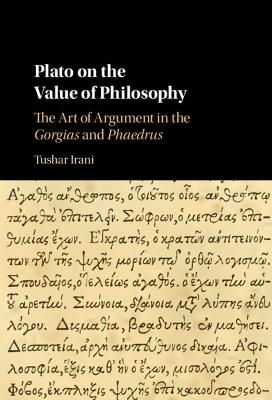
Plato on the Value of Philosophy
The Art of Argument in the Gorgias and Phaedrus
Seiten
2017
Cambridge University Press (Verlag)
978-1-107-18198-4 (ISBN)
Cambridge University Press (Verlag)
978-1-107-18198-4 (ISBN)
The first study to examine how Plato's views on moral psychology underlie his thought on the proper practice of argument. This volume will appeal to those interested in the nature and value of rhetoric in civic life, as well as to students of Platonic dialogue.
Plato was the first philosopher in the western tradition to reflect systematically (and often critically) on rhetoric. In this book, Tushar Irani presents a comprehensive and innovative reading of the Gorgias and the Phaedrus, the only two Platonic dialogues to focus on what an 'art of argument' should look like, treating each of the texts individually, yet ultimately demonstrating how each can best be understood in light of the other. For Plato, the way in which we approach argument typically reveals something about our deeper desires and motivations, particularly with respect to other people, and so the key to understanding his views on the proper practice of argument lies in his understanding of human psychology. According to this reading, rhetoric done well is simply the practice of philosophy, the pursuit of which has far-reaching implications for how we should relate to others and how we ought to live.
Plato was the first philosopher in the western tradition to reflect systematically (and often critically) on rhetoric. In this book, Tushar Irani presents a comprehensive and innovative reading of the Gorgias and the Phaedrus, the only two Platonic dialogues to focus on what an 'art of argument' should look like, treating each of the texts individually, yet ultimately demonstrating how each can best be understood in light of the other. For Plato, the way in which we approach argument typically reveals something about our deeper desires and motivations, particularly with respect to other people, and so the key to understanding his views on the proper practice of argument lies in his understanding of human psychology. According to this reading, rhetoric done well is simply the practice of philosophy, the pursuit of which has far-reaching implications for how we should relate to others and how we ought to live.
Tushar Irani is Assistant Professor of Philosophy and the College of Letters at Wesleyan University, Connecticut.
Preface; Introduction; Part I. The Gorgias: 1. Socrates and Gorgias on the aims of argument; 2. Towards an art of argument; 3. The contradictions of Callicles; 4. Pleasure, virtue, and the human good; Part II. The Phaedrus: 5. Socrates and Lysias on the aims of love; 6. Loving wisdom; 7. Loving others; 8. The self-motion of the soul; Conclusion; Bibliography; Index locorum; Subject index.
| Erscheinungsdatum | 02.04.2017 |
|---|---|
| Zusatzinfo | Worked examples or Exercises |
| Verlagsort | Cambridge |
| Sprache | englisch |
| Maße | 152 x 229 mm |
| Gewicht | 480 g |
| Themenwelt | Geisteswissenschaften ► Philosophie ► Ethik |
| Geisteswissenschaften ► Philosophie ► Philosophie Altertum / Antike | |
| ISBN-10 | 1-107-18198-4 / 1107181984 |
| ISBN-13 | 978-1-107-18198-4 / 9781107181984 |
| Zustand | Neuware |
| Haben Sie eine Frage zum Produkt? |
Mehr entdecken
aus dem Bereich
aus dem Bereich


